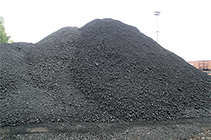It looked like a shiny, black pile of asphalt, it was three storeys high – and it was growing. When residents of Windsor, Ontario, and Detroit protested a mountain of petroleum coke, an oilsands byproduct, accumulating near a refinery along the Canada-U.S. border, the company removed it – temporarily. But this particular petcoke pile was not the only one affecting Canadians. The Alberta oilsands produce heaps of the stuff annually and there are already tens of millions of tons stockpiled in Alberta.
What’s going to happen to it?
The answer may lie in research by Heather MacLean, a professor of chemical engineering, and her former student Jennifer McKellar (PhD 2012), who recently completed a post-doc jointly at the University of Toronto and the University of Calgary. McKellar’s doctoral thesis outlined a model to determine the most environmentally sound and economically sensible options for dealing with a petcoke stockpile.
The problem with the substance from an environmental perspective is its high carbon content. “You don’t want to just combust it,” says MacLean, “because it would be similar to combusting coal.” It’s possible to process petcoke into natural gas, which burns relatively cleanly, but “gasification systems are expensive and not widely used,” says McKellar.
MacLean and McKellar’s model suggests a third option: processing petcoke into hydrogen. Currently, hydrogen plants make hydrogen from natural gas. The model that MacLean and McKellar devised suggests that it will be cheaper in the future to process hydrogen from petcoke than from natural gas. As well, it’s possible to make hydrogen from petcoke resulting in overall lower emissions than making it from natural gas – as long as carbon capture and storage technology is used. Not only is hydrogen an important component in oil refining (it helps remove sulphur), but it can also be sold to the chemical and electronics industries.
“There has been quite a lot of industry interest in the idea,” notes MacLean, who helps lead the Life Cycle Assessment of Oil Sands Technologies Project.





